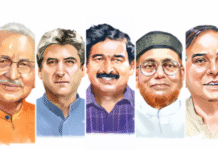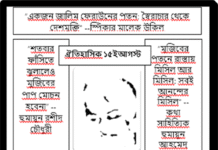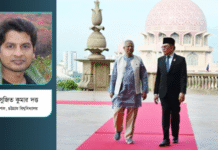
“Online activists claimed that Rajib had been blogging against the activities of Jamaat and Shibir which made him a possible “target” of the religion-based organisation for his interpretation of Islam from the standpoint of a self-proclaimed atheist.”- ‘Didn’t see such brutal murder before’, bdnews24.com.
Here’s a challenge for all of you, my dear readers: Don’t think about a cup of tea. Don’t imagine it in any form. Do not conjure its smell, taste, or sight. Were you successful? Chances are, before you started to read my article, you weren’t thinking at all about a cup of tea, and my invitation not to think about it had the opposite result.
When I say atheism can actually be a path toward God, away from religion, perhaps, but definitely toward God, it’s like that cup of tea. Look at any blog on atheism. Count how many times those atheists mention God versus any other blog, any television show, any form of entertainment. God has ordained a purpose for these atheists, of keeping His name even upon the lips of the unbelievers.
I tried to find some of Ahmed Rajib Haider’s the blog entries and quotes. I thought I might create an imagined dialogue between us. I think I would have liked to have a debate with him, atheist versus believer. I think we could have discussed such matters over the blogosphere, or seated across a table from each other at meal. He would have made his points, and I would have made mine, and, most likely, neither of us would have been shaken in our faith, but we might have parted friends all the same.
And maybe I would have thanked God for the opportunity to explore the foundations of my faith by contrasting it to the arguments of an atheist. Perhaps that young atheist would have left the table with a different perspective of religion.
Faith, by its very definition is not a matter of proof. Faith is from God, and it issues from our being like a sense, like hearing, seeing, or smelling. Our soul is to faith what our eyes are to vision. It’s a way we who believe in God have of experiencing the world. I believe it is the only sense that survives our physical demise. Religion, on the other hand, is a creation of man. It is the human reaction to what the soul senses. It tries to offer a corrective lens to the soulfully myopic. It attempts to restore sight or to those whose faith has been burned to the retina by those flashes of injustice and tragedy, or poisoned by alcohol, or purely hedonistic pursuits, or hatred.
Or hatred.
Or hatred.
Sometimes religion reminds me of the times, as a child, I attempted to wear my mother’s glasses. The world became blurred, my head ached, and for a time, even after I’d taken them off, I had a hard time restoring my vision to clarity. The fact is that perhaps every prescription does not uniformly fit every soul, and therefore we have many forms of corrective lenses of the spirit, which we call “religions”.
What I can see without corrective lenses, what is absolutely twenty-twenty to me, is that killing is wrong, and killing in the name of God is the worst possible blasphemy because it plays to the prejudices of those who would strike God from our daily lives. It justifies the claim that conversations about God are provocative and lead to violence. It justifies the claims of those, like the powers in Europe, who would use these claims to ban minarets and religious symbols.
I am the farthest thing from an atheist. Although I don’t really prescribe to any one particular religion, prayer is part of my daily life, especially during this season of Lent. But I have also observed Ramadan, and my English copy of the Quran is dog-eared from all the re-reading of my youth.
As events in Bangladesh unfold, I notice some interesting positioning strategies emerging on all fronts. Some anti-Shahbag propagandists seem to be attempting to paint the movement as something more insidious than merely secular — spinning the movement as a struggle between the faithful and the nonbelievers. The brutal assassination of blogger Ahmed Rajib Haider seems to be a line in the sand, an attempt by extremists to define a political struggle along religious lines. I don’t think it was any coincidence that the victim was an avowed atheist.
But who are the real atheists here? Is the slaughter of a young man, a child of God like any other, really a reflection of Divine Will? I mean, we’re talking about God, the Merciful and Compassionate. We’re talking about the Creator of all souls. What these butchers did by hacking this blogger’s body to pieces was more worthy of Huitztilpochtli, the Aztec God of War. Where is the hand of God in this killing? By brutally, sadistically mutilating this man, this creation of God, the murderers are actually justifying the position of the atheists.
Meanwhile, I may be far from the picture, but from here, the Prime Minister and members of the opposition have made some pretty obvious attempts to co-opt the movement for political gain.
All the usual players have weighed in, and clearly they are all frightened.
I don’t know how to say this, and I don’t know if it’s my place. I don’t know if it’s even legal to say it, but my experience and knowledge of the history of Latin America has taught me one thing: When a popular movement gathers strength, the power brokers that most successfully threaten the movement are the ones who remain silent.
Here’s more: In my short experience in writing for bdnews24.com, this Shahbagh protest is different than anything I’ve ever seen. How often has there ever been an anti-Hartal? This movement may have started as a cry for justice, but it has become something more.
1. It is a vote of no-confidence.
Not just a vote of no-confidence in a judicial system that botches a case, but against all the power brokers. It is a sweeping of the floor. It points the finger at the government in power, which did not pursue the verdict aggressively enough. It points the finger at the opposition, whose desire to rise to power occasioned it to ally itself with the same party it must now reject or face a complete loss of credibility.
2. It is a vote of yes-confidence.
The sense that the people themselves can do better has been palpable to me for as long as I’ve been writing these missives. The shift I see is that instead of Bangladeshis saying, “We deserve better,” you are now saying “We can do better”. The distinction is very important. It’s like the difference between religion and faith. It means that the people are awakening to the fact that Bangladesh’s pool of talent is deep. A new generation is ready to come of age, and the old guard might do well to step aside.
For so many years, your two bespectacled leaders have been trying to lend you their glasses and inviting you to see the world through their strong prescriptions, even though the great majority of you can see the problems twenty-twenty. The results have been predictable — blurred vision and endless headaches. Now, finally with the spectacles off, the Shahgbag protests represent restoring clarity to vision.
Through my personal faith-based prescription glasses, I imagine the afterlife of both the murderers and the victim. Both will be surprised at what awaits them, but of the two, I think that only for the young blogger the surprise will be pleasant.
See, I like to think that there is a place in heaven for sincere people no matter what their beliefs. I imagine God, in His infinite mercy and compassion, smiling upon his beloved rebellious child, Ahmed Rajib Haider, and congratulating him on having the courage to risk condemnation and brutal assassination. Such brave people are more holy than fear-motivated goons who raise their machetes to sacrifice free thinkers to the false gods of petty self-righteousness.
Meanwhile, may God Bless you, Bangladesh.
——————————-
Frank Domenico Cipriani writes a weekly column in the Riverside Signal called “You Think What You Think And I’ll Think What I Know.” He is also the founder and CEO of The Gatherer Institute — a not-for-profit public charity dedicated to promoting respect for the environment and empowering individuals to become self-taught and self-sufficient. His most recent book, “Learning Little Hawk’s Way of Storytelling”, teaches the native art of oral tradition storytelling.
Source: bdnews24 opinion










I agree with the author about the muder of a young man. Islam does not support any unlawfull killing. But author does not have enough knowledge to comment about Islam. Islam is not just religion or just faith, it is a way of life. It involves politics and social justice and legislation. If you read and ponder and have analytical eye about Islam then you will be able to see it is not just a religion. Islam is not without prove. It is scientifically proven without a dought that there is Allah the Almighty. It is proven like 2+2=4. If you read about the creation of Universe then you will know whether their is any creator or not. If you read the the scientific facts in the Quran which is not possible for a man to know at that time and it was only possible for a man to know those facts from other then man. I just give some hints, now you find yourself.
Tanks.